With two World Championships on the agenda, and Ireland’s biggest sailing event – the Volvo Dun Laoghaire Regatta - making its biennial appearance at mid-season, 2019’s sailing programme couldn’t be anything other than interesting as it also included the increasingly popular D2D – aka the Dun Laoghaire to Dingle Race – and a re-vamped Sovereign’s Cup at Kinsale which included the Irish Half-Ton Championship and two One-Design classes.
But as the developing sailing programme for 2019 was being finalised in the latter part of the 2018 season, it was pointed out that the seven-week period between the start of the main fixtures with the Scottish Series at Tarbert in May 2019 and the conclusion of the Volvo Dun Laoghaire Regatta on July 14th was distinctly compressed, with a series of pillar events at different venues almost nose-to-tail, which would see boats taken as far north as Loch Fyne, and as far west as Dingle in the midst of a very crowded schedule.
The suggestion was that this would distort the perception and enjoyment of the season, yet it overlooked the fact that - apart from the Sovereign’s Cup series at Kinsale at the end of the June, and the VDLR 19 itself in mid-July - the other big happenings were purely for cruiser-racers.
For sure, with their large crews, they raise the number of active participants and interest in their major championships. Yet the idea that it would all happen with a Big Bang in seven weeks, and that the rest of the season would seem an empty desert, by comparison, proved well off target.
There was always something going on every week of the season, and if the “Seven-Week Scrunch-up” did mean a concentration of emphasis on cruiser-racer competition in that period, at alternative times the sailing community – including cruiser-racers themselves – could think of other things such as the build-up towards the Olympics in 2020, the many dinghy championships, the growth of classics, the strength of the traditional boat movement, and even the mysterious world of long-distance voyaging.
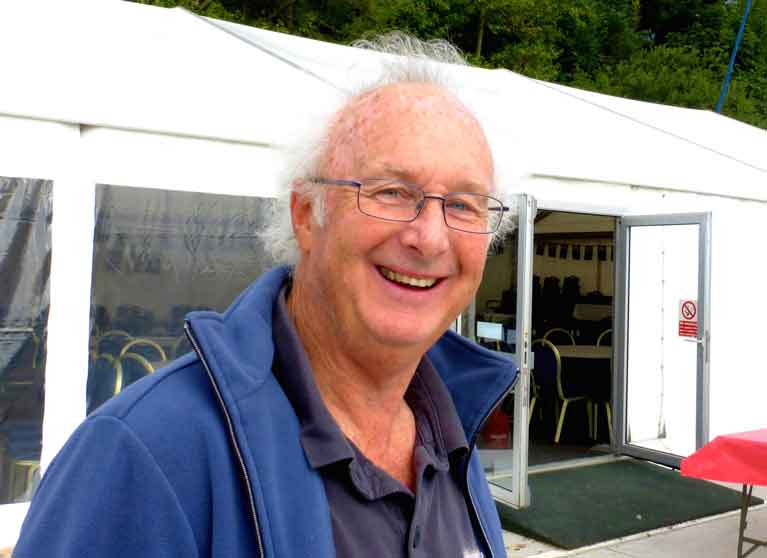 Curly Morris: veteran sailor, respected sailing administrator, and GP 14 addict. Photo: W M Nixon
Curly Morris: veteran sailor, respected sailing administrator, and GP 14 addict. Photo: W M Nixon
It was that thriving organisation, the GP 14 Association of Ireland, which started things in mid-January with a special invitation regatta and dinner at Skerries – with boats representative of every major GP 14 centre throughout Ireland – to celebrate the 75th birthday of one of their most devoted adherents, Curly Morris of Larne. His love of the GP14 is well matched by his skills in sailing and sailing administration, such that he is a member of World Sailing’s Class’s Committee, and later in the year, he was also elected President of GP14 International. But at Skerries, as is right and proper, the sailing came first, and despite it being January they fitted in three quick race with the honours going to Ger Owens of RStGYC, crewed by Curly’s daughter Melanie.
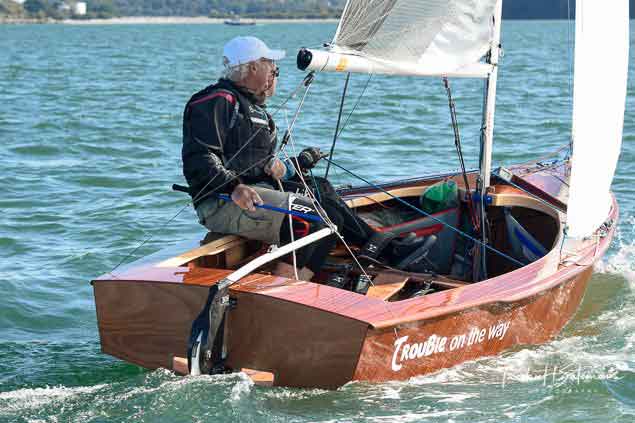 Curly Morris racing his GP 14 Trouble on the Way with Royal Cork YC at Crosshaven. Photo: Robert Bateman
Curly Morris racing his GP 14 Trouble on the Way with Royal Cork YC at Crosshaven. Photo: Robert Bateman
Nevertheless sailing is generally under wraps in January, yet that same weekend in Dun Laoghaire, the Irish National Sailing School – “The School that Never Sleeps” – provided boats and personnel to help Race Officer Vincent Delany stage the Inter-Schools Shanahan Cup, presented by 2015 Sailor of the Year Liam Shanahan, the winners being Gonzaga College with a team of Jack Fahy, Andrew Conan, Henry Higgins, Finn Cleary, Tom Higgins, and Con Murphy.
There were various frostbite series well underway at several centres, but by March the Inter-varsities were swinging into play, the main action being the IUSA Championship on Lough Key. All credit to the Irish Universities, they’re very imaginative in their choice of interesting venues, as Lough Key is one of the loveliest of the Shannon lakes, yet it is seldom used for sailing events.
The racing was extremely close, but in the end, it was UCD all the way, with their team of helms Jack Higgins, Patrick Cahill and Daniel Raymond, and crews of Alanna Lyttle, Lucy McCutcheon and Katie Cassidy besting Trinity in a nail-biting finish. UCD seem to be getting it right every which way, as Lucy McCutcheon was voted Captain of the Year, and UCD also became IUSA Club of the Year.
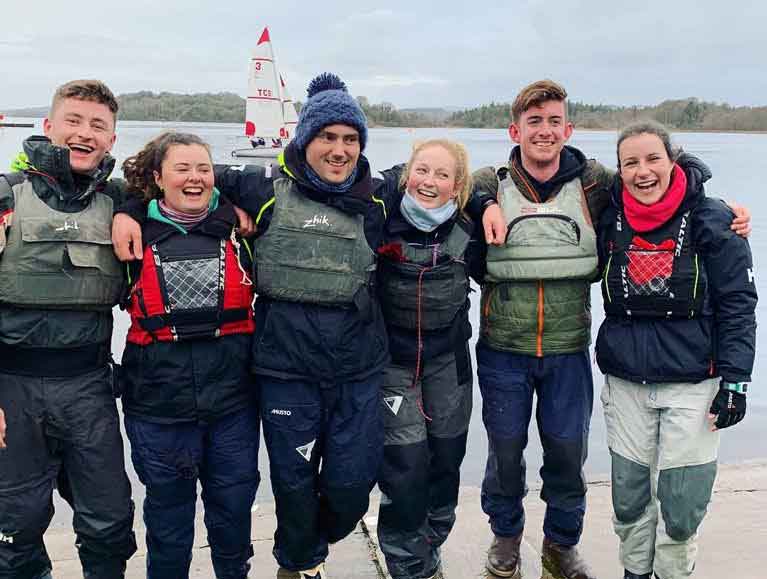 The UCD Team, winners of the Irish Inter-Varsities 2019 at the imaginatively-chosen venue of Lough Key, included helms Jack Higgins, Patrick Cahill and Daniel Raymond, and crews Alannna Lyttle, Lucy McCutcheon and Katie Cassidy – their Captain Lucy McCutcheon (third right) was also voted IUSA Captain of the Year.
The UCD Team, winners of the Irish Inter-Varsities 2019 at the imaginatively-chosen venue of Lough Key, included helms Jack Higgins, Patrick Cahill and Daniel Raymond, and crews Alannna Lyttle, Lucy McCutcheon and Katie Cassidy – their Captain Lucy McCutcheon (third right) was also voted IUSA Captain of the Year.
Came April, and the early season in its traditional form starts to show signs of life, with the first of the ISORA races harshly testing enthusiasm, for though the days may be getting longer and the sunshine a bit warmer, April is when the sea is at its coldest. Thus many were thinking of Antigua Sailing Week, a few even got themselves there, and it felt like home with one of the leading contenders being the Antigua National Sailing Academy’s own Royal Cork 1720 - far from home in miles maybe, but very much at home in the brisk conditions by providing the ideal step-up boat for youngsters making their way from dinghies into keelboats.
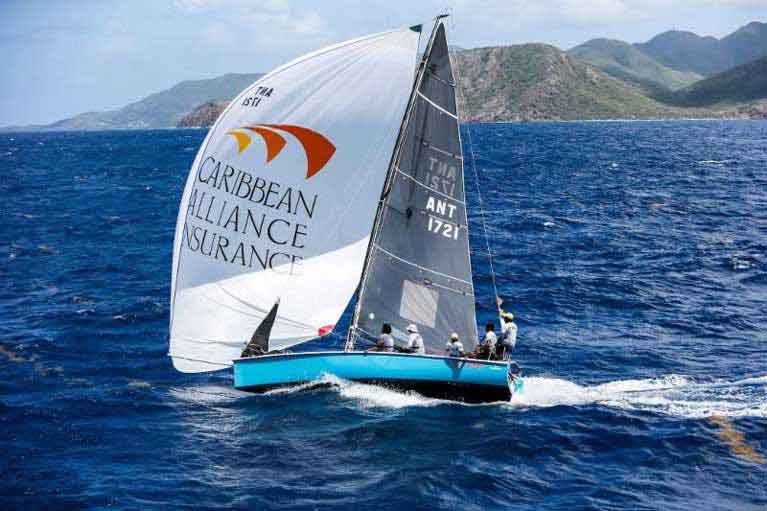 A bit of Ireland in the Caribbean – Antigua National Sailing Academy has found that the Royal Cork 1720 Sportsboat provides an ideal step-up from dinghies to keelboats.
A bit of Ireland in the Caribbean – Antigua National Sailing Academy has found that the Royal Cork 1720 Sportsboat provides an ideal step-up from dinghies to keelboats.
Nevertheless back home those raw early races kick-start the main sailing programme, and by mid-May, club sailing is active, and the first dinghy Nationals have already been staged with the well-supported Laser Masters at Howth going to Royal St George’s Sean Craig. Meanwhile keelboats are already looking overseas, with Pat Kelly’s J/109 Storm of Rush and Howth leading the charge to Scotland – a progression which eventually saw Storm becoming the RC35 Champion 2019, while the Scottish Series saw something of an Irish clean sweep, with Andrew Craig’s J/109 Chimaera (RIYC) winning IRC 2 and overall – Andrew being Sean Craig’s brother, it was a good month for Clan Craig. Back in Tarbert, Jay Colville’s First 40 from East Down YC in Strangford Lough won Class 1, with IRC 3 going to Jonny Swan’s Half Tonner Harmony (Howth YC), while Rory Fekkes’s up-graded First 8 F’n Gr8 from Carrickfergus was tops in IRC 4, and a special award went to John & Brian Hall of the NYC with their J/109 Something Else, who were fourth in class and have done a record number of the Scottish Series.
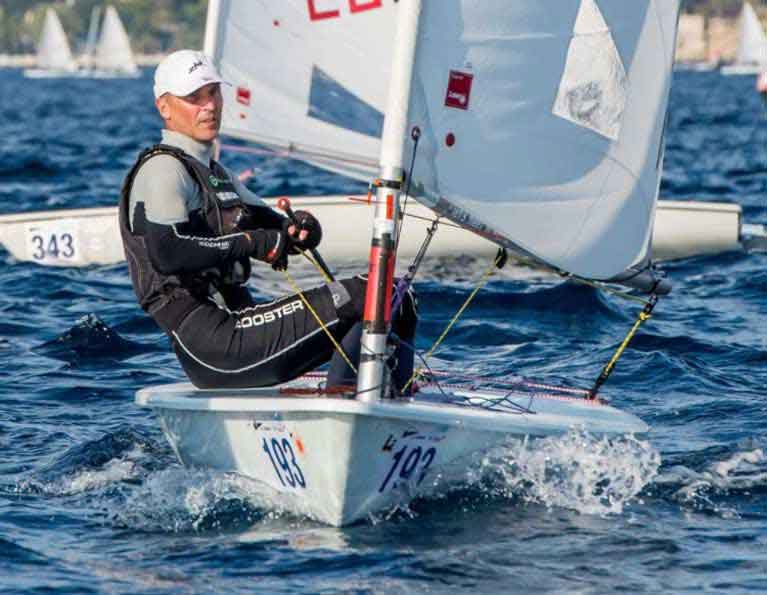 Sean Craig (RStGYC), Irish Lasers Masters Champion 2019
Sean Craig (RStGYC), Irish Lasers Masters Champion 2019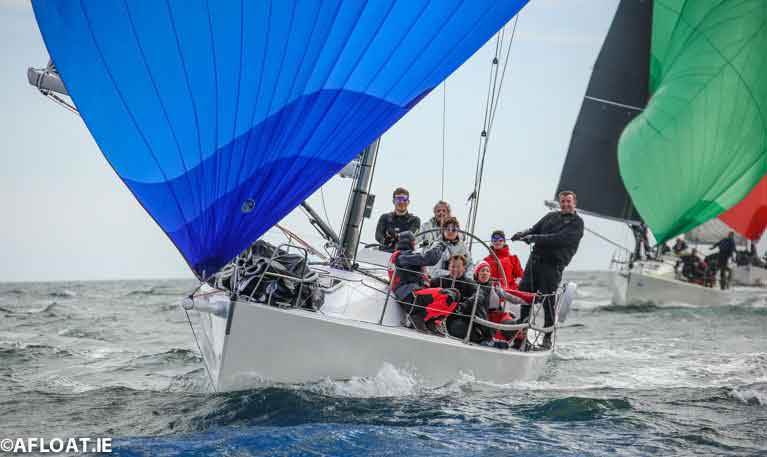 Andrew Craig’s J/109 Chimaera (RIYC), overall winner of the Scottish Series. Photo: Afloat.ie
Andrew Craig’s J/109 Chimaera (RIYC), overall winner of the Scottish Series. Photo: Afloat.ie
But even while the racers were upping the pace, before May was out the painstakingly-restored 1926-built 56ft Conor O’Brien made her number in Dublin Bay, having sailed round from Limerick in line with her work for Sailing into Wellness and the promotion of the proposed Salmons Wake voyage to West Greenland. It was a fine evening of early summer as a large crowd of well-wishers met her at the Royal Irish YC, and while the programme as outlined by Project Manager Gary MacMahon seemed decidedly ambitious, when Ilen finally returned to her south coast base at the Trident Hotel on September 4th she had achieved all her objectives which included a double-crossing of the Atlantic.
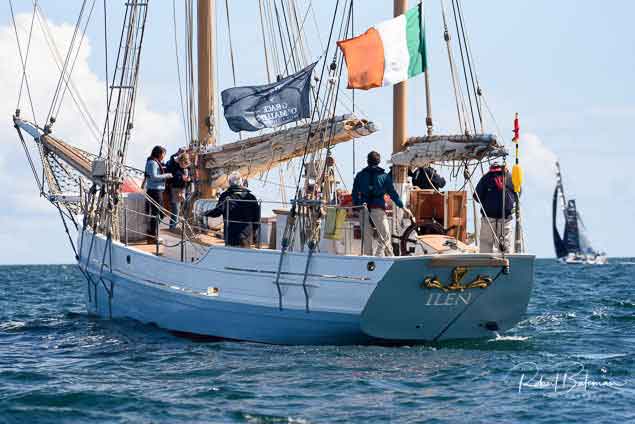 The restored ketch Ilen off Kinsale during the Figaro visit to Kinsale. By the time she returned to Kinsale early in September, she’d completed a 5,000 mile two-way Transatlantic voyage to West Greenland. Photo: Robert Bateman
The restored ketch Ilen off Kinsale during the Figaro visit to Kinsale. By the time she returned to Kinsale early in September, she’d completed a 5,000 mile two-way Transatlantic voyage to West Greenland. Photo: Robert Bateman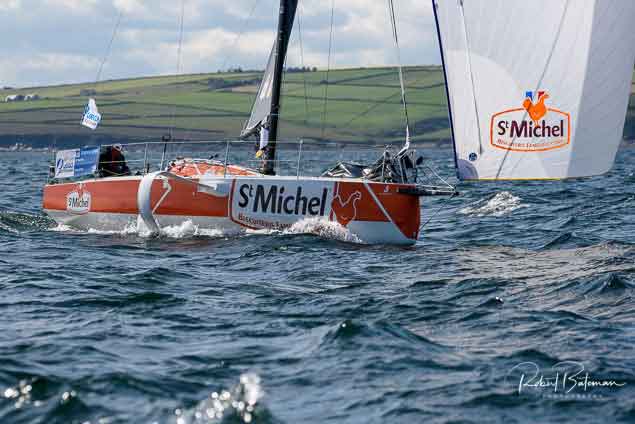 The new foiling Figaro 3s made their international debut at Kinsale at the beginning of June. Photo: Robert Bateman
The new foiling Figaro 3s made their international debut at Kinsale at the beginning of June. Photo: Robert Bateman
Before going back to Greenland, Ilen was to act as a Support Boat at Kinsale in early June for the visit by the Figaro Solo fleet from France, which included Ireland’s Tom Dolan and Joan Mulloy who – like their rivals – were still getting to grips with their new foiling Figaro 3s. Later in the series in the English Channel, Tom was to take the Top Rookie prize for one of the legs, but when they came to Kinsale both Irish sailors were still on a wellnigh vertical learning curve, while the organisers were learning that the Irish weather is a perverse beast – there was generally plenty of wind around during early June, but at the time the Figaro organisers wanted to send their record 50th Anniversary fleet on a long leg taking in the Isle of Man, there was so little wind in prospect that they were sent direct to the next port in France.
June was the ultra-busy month for the domestic fleet, starting with the Lambay Races at Howth where the overall winner was the keenly-campaigned veteran Club Shamrock Demelza (40 years and counting) sailed by Steff Ennis & Windsor Laudan, which somehow emerged triumphant from the midst of a complex fleet many of whom were already gearing up for the four day Frank Keane BMW ICRA Nationals at Royal St George YC the following Thursday.
With a good entry, the main point of interest in the lead-in phase was where the Class Divisions would be made, something which proved to be of exceptional relevance as it put the Half Tonners into Division 2, yet kept a whole gaggle of X Yachts free of the Half Ton shadow and able to spread their wings in Division 3.
The fact is the Half Tonners tend to dominate whichever Division they’re in, and this was very much the case at the ICRA Nats, where Michael & Darren Wright and Rick Deneve’s relatively recently-acquired Half Tonner Mata from Howth pipped it by half a point from Nigel Biggs’ Checkmate XVIII, and on down the line there was no getting away from the fact that the first seven placings in IRC2 saw six slots being filled by Half Tonners.
Meanwhile, apparently safely ensconced in IRC 3, the Gore-Grimes family’s X310 Dux found she was bundled in with F’n Gr8 fresh from Rory Fekkes’s Scottish success, but Dux took it all in her stride, logging a scoreline of 3,3,1,1,1,1,2 against the Carickfergus boat’s 1,1,4,3,2,2,3, which gave it to Dux by 12 pts to 16, and as Division 3 was the largest class with 23 racing, Dux had the bonus of being declared overall winner of the ICRA Nats.
Division 1 was dominated by J/109s, with John Maybury’s Joker II (RIYC) compensating for the fact that Howth boats had won IRC 2 and IRC 3 by being well ahead in the final points of Storm and Outrajeous (Richard Colwell & John Murphy). And RIYC scored too in the Coastal Division, where ten hot boats showed they preferred something a little different from slugging up and down between the cans, with Paul O’Higgins’ JK 10.80 Rockabill VI winning overall from the First 40 Forty Licks, with the Sunfast 3600 Yoyo (Brendan Coghlan RStGYC) third.
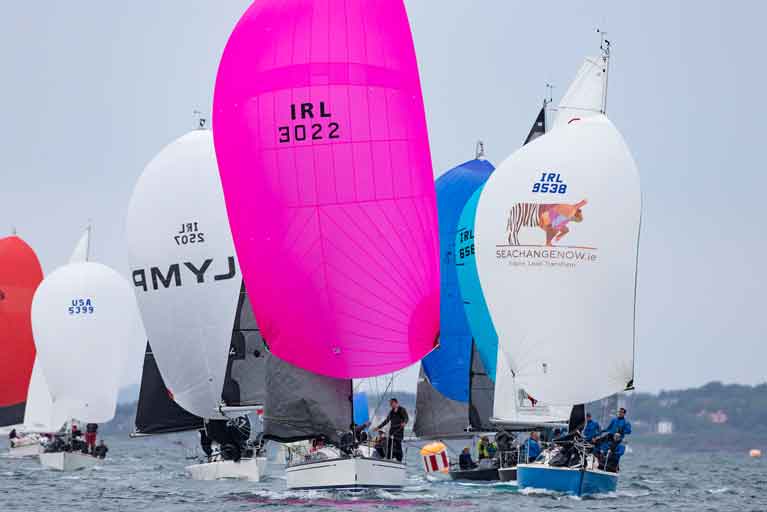 The Frank Keane BMW ICRA Nats 2019 at RStGYC on Dublin Bay, with the X-302 Xebec (Bourke/McGirr/Ball) from Howth leading the charge
The Frank Keane BMW ICRA Nats 2019 at RStGYC on Dublin Bay, with the X-302 Xebec (Bourke/McGirr/Ball) from Howth leading the charge
With the successful ICRA Nats 2019 safely put to bed, the focus immediately switched to the National YC’s 270-mile Volvo Dun Laoghaire to Dingle Race on the evening of Wednesday 12th June. While the weather in May had been reasonably bright if cold, June was having too much grey, and the D2D start day was a damp misery, but at least as the low-pressure area which was causing it was shifting to the eastward to draw the wind from the north, the large and varied fleet went off at increasing speed in a fair wind.
“Large and varied” scarcely does it justice, as the fleet of 46 starters included some of the most impressive cruiser-racers from Ireland and the Irish Sea, and ranged in size from Mick Cotter’s Southwind 95 Windfall dwarfing everyone at the top end down to the two Mintransat boats, Louis Mulloy’s Blackshell Farm from Mayo and Yannick Lemonnier’s Port of Galway, where there’d been a sudden crew change the day of the start as regular co-skipper Dan Mill was out with a serious knee injury, but SB20 sailor John Malone of Lough Ree YC gallantly stepped into the breech at the last minute, and acquitted himself with style in a tough cold race.
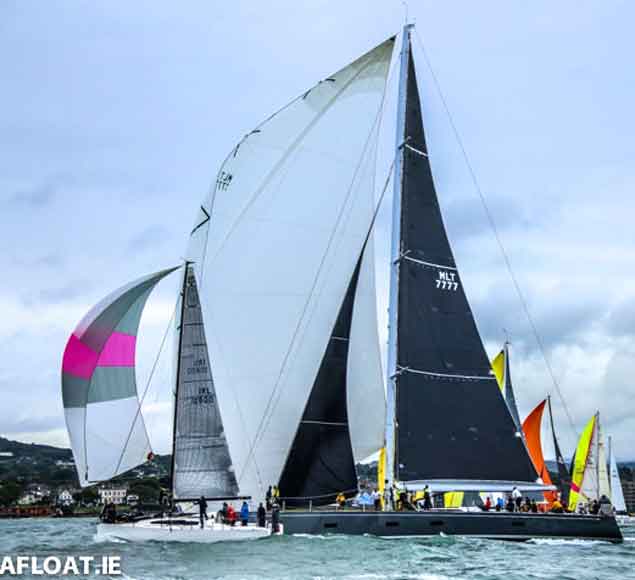 The start of the Dingle Race, with overall winner Rockabill VI (Paul O’Higgins, left) dwarfed by line honours winner and new record setter Windfall (Mick Cotter). Photo: Afloat.ie/David O’Brien
The start of the Dingle Race, with overall winner Rockabill VI (Paul O’Higgins, left) dwarfed by line honours winner and new record setter Windfall (Mick Cotter). Photo: Afloat.ie/David O’Brien
With the wind in the north it looked all set for Windfall to break the 24hr 48min course record set by her predecessor, the 78ft Whisper, in 2011 – and maybe even chop the 24 hours while she was at it. But the D2D is a cussed beast, there are always holes in the wind, and a veering northerly means you are slugging into it in confused seas in the final stage off the West Cork and Kerry coast from the Fastnet round the Great Skellig and on into Dingle. So in the end, although Windfall did manage a new record, it was by just 20 seconds better than Whisper’s 2011 time.
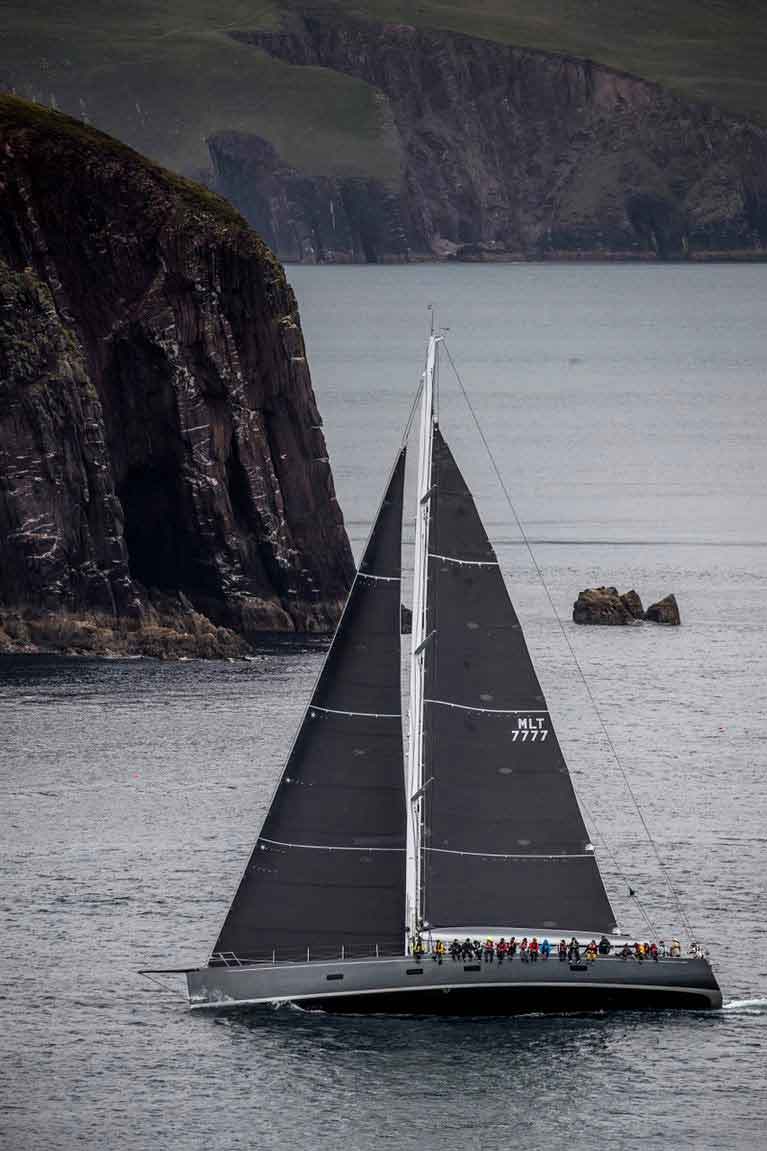 Big boat, big country…..Windfall crosses the finish line at Dingle to establish a new D2D course record. Photo: Rachel Fallon
Big boat, big country…..Windfall crosses the finish line at Dingle to establish a new D2D course record. Photo: Rachel Fallon
In the main part of the fleet, Andrew Hall’s skinny J/125 Jackknife from Pwllheli had been revelling in the running and reaching to show the way down the east coast and along the south, but once the upwind stuff came top of the agenda, less extreme boats got in on the act. Yet though Chris Power Smith’s J/122 Aurelia (RStGYC) was putting in an impressive show, the defending champion, Paul O’Higgins’ JPK 10.80 Rockabill VI (RIYC) was always there or thereabouts, and at the finish, she pounced to finish ahead of the bigger J/122 and correct into an unassailable lead.
Meanwhile the J/109s were not only giving the rest of the fleet a tough time, but they were having some mighty battles among themselves, and though Johnny Murphy in Outrajeous seemed to have everything under control to have all other J/109s astern going down to the Fastnet – sometimes by a quite substantial margin – at the Fastnet itself Outrajeous slipped into the wrong side of a flatter patch, and Ruth (NYC) - with 19-year-old Ben Shanahan the youngest skipper in the race – slipped past her right in at the Rock and stayed ahead all the way to the finish, where it was noted that these two J/109s had sailed maybe the most efficient race of all, as Ruth completed the 270 mile course with 279 miles logged, yet Outrajeous managed it with only 277 miles.
But minimal miles are of little use of they’re sailed at low speed in a light patch. You can live with extra miles or two if the boat is roaring along, and for much of the race Rockabill VI was doing that very thing, making her overall winner by a remarkable 50 minutes and 47 seconds with Aurelia second, the Sunfast 3600 Hot Cookie (John O’Gorman, NYC with Mark Mansfield onboard) third, Ruth fourth, Jackknife 5th, and Outrajeous sixth.
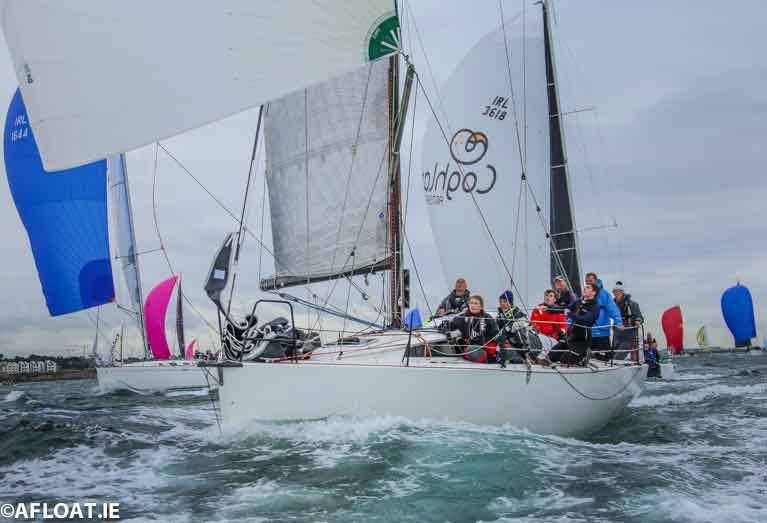 Paul O’Higgins’ JPK 10.80 Rockabill VI – in addition to becoming overall winner of the Dun Laoghaire to Dingle race, she is now ISORA Champion 2019 and ICRA Boat of the Year.
Paul O’Higgins’ JPK 10.80 Rockabill VI – in addition to becoming overall winner of the Dun Laoghaire to Dingle race, she is now ISORA Champion 2019 and ICRA Boat of the Year.
As for the two little ’uns, Port of Galway was first of the two Minitransat boats and had an hour and 54 minutes in hand on Blackshell Farm, so clearly John Malone’s SB 20 experience stood him to the good in a decidedly rugged race.
The theory of the timing of the D2D was that it would allow participants a reasonable margin to get themselves to Kinsale for the four day O’Leary Life Sovereign’s Cup at the end of June while still making some token appearances at the workplace, and certainly there were some who managed it all to enjoy Kinsale en fete, with that unique atmosphere of sail, sport and socialising which Ireland’s Number One hospitality venue lays on so very well.
Until now, anyone who remembers the overall review from 2018 will have been wondering what might have happened in 2019 to Frank Whelan’ star boat of that year, the Grand Soleil 44 Eleuthera from Greystones. Well, the Sovereign’s proved that Eleuthera most certainly hadn’t gone away for 2019. She’d always been pushing towards the frame in the earlier events, but at Kinsale she burst through with a convincing display of six wins in some demanding racing to take the Sovereign’s Cup in style for the best overall performance in IRC.
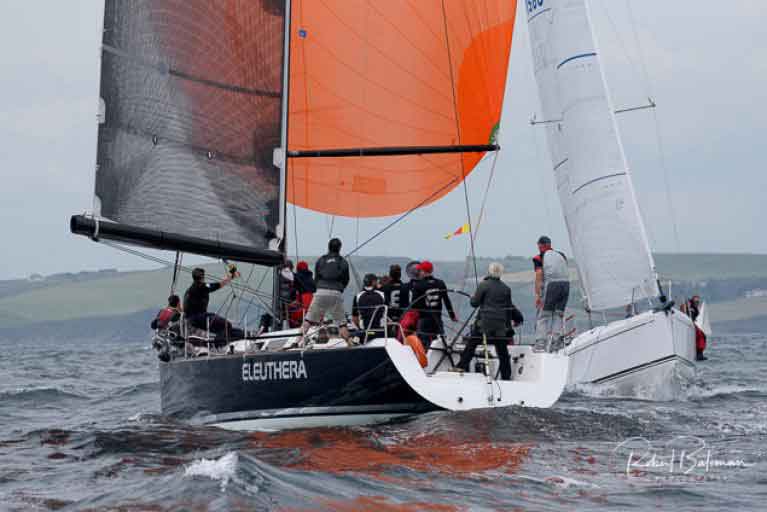 Frank Whelan’s Grand Soleil 44 Eleuthera from Greystones was tops at the Sovereigns. Photo: Robert Bateman
Frank Whelan’s Grand Soleil 44 Eleuthera from Greystones was tops at the Sovereigns. Photo: Robert Bateman
So that was one up to the East Coast. But when it came to the Portcullis Cup for the top scorer in ECHO, it couldn’t have gone further west, as it went to John Gordon’s X-Rated from Mayo SC in Clew Bay in the heart of Connacht. This neat balance then left it open house for others results, and few were more interesting than the Half Tonners, where Nigel Biggs’ Checkmate XVIII (RIYC & HYC) won the IRC Class overall, but in the scoring system which the Half Tonners had devised for themselves within the format of the regatta, the new Irish Half Ton Champion was the Wright brothers and Rick De Neve’s impressively up-graded Mata from Howth.
Other winners included George Sisk’s Xp44 WOW (RIYC) in the Coastal Class, the J/109 Outrajeous (Richard Colwell & Johnny Murphy) in IRC 1, and Martin Byrne’s International Dragon Jaguar (RStGYC), with the class being included in the Soveriegn’s as part of the buildup to Kinsale’s hosting of the Dragon Gold Cup in 2020. Also right there was Kinsale’s own John Twomey in his Bruce Kirby-designed Blazer 23, who had a clean sweep in WS IRC2, his crew including Eugene Hinkel who built the original moulds in Canada and thus got double enjoyment out of his visit to Kinsale.
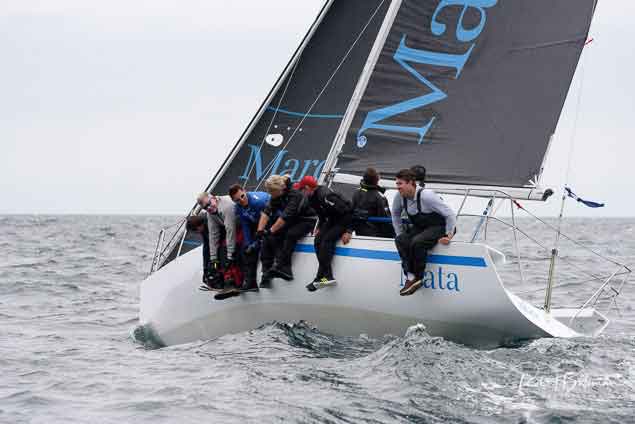 Mata (Michael & Darren Wright and Rick De Neve, HYC) emerged from the Sovereign’s Cup at Kinsale as the new Irish Half Ton Champion
Mata (Michael & Darren Wright and Rick De Neve, HYC) emerged from the Sovereign’s Cup at Kinsale as the new Irish Half Ton Champion
In the end, a full programme was patiently chiselled out of some distinctly uncooperative weather by senior Race Officer, Irish Sailing President Jack Roy, while the overall organisation by Bobby Nash coped very well with conditions which were erratically typical of much of 2019’s weather, and of which John Twomey wrily commented: “The weather is the boss”.
However, with July and the Volvo Dun Laoghaire Regatta approaching, the weather finally began to take on a proper summery tinge, and with prospects looking good, late entries pushed the lineup in the 30-plus classes so near to 500 boats that most people claimed it had been achieved, though maybe 498 might more accurately hit the spot.
Either way, it was a lot of boats and a colossal number of sailors counting on the four days from 11th July to 14th July to provide them with the highlight of their summer’s sailing. Organising Committee Chairman Don O’Dowd and his specialist team, together with an army of volunteers, had everything in place to run smoothly with the Dun Laoghaire waterfront hospitality and entertainment machine, so all they needed was some sunshine and a bit of a breeze, and they got those too, so once again it was a very special event which showed just what Dun Laoghaire can do if given the chance.
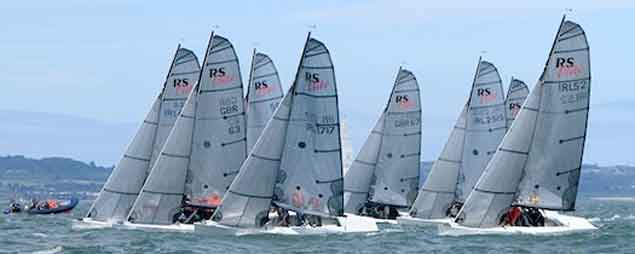 The RS Elites came visiting to make the VDLR 2019 their annual championship
The RS Elites came visiting to make the VDLR 2019 their annual championship
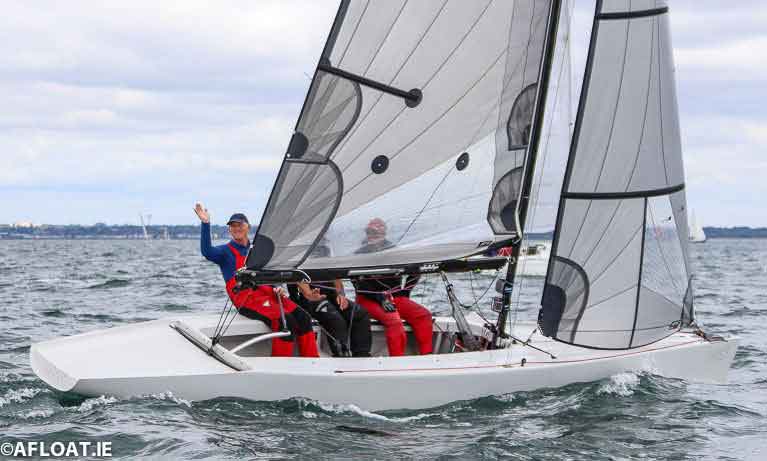 Olympic sailing medallist Mike McIntyre after retaining the title in the RS Championship in Dublin Bay. Photo: Afloat.ie/David O’Brien
Olympic sailing medallist Mike McIntyre after retaining the title in the RS Championship in Dublin Bay. Photo: Afloat.ie/David O’Brien
As usual, it attracted some exotic entries from across the Channel, including three dozen RS Elites who had selected the VDLR as the setting for their 2019 British & Irish Championship, with former Olympic medallist Mike McIntyre emerging – not for the first time – as the class champion. In style, they couldn’t have been more different from another visiting class, the 1898-vintage Seabird Half Raters from Treardur Bay across in Anglesey, with the expedition by the Seabirds and Treardur’s 14ft Morgan Giles-designed Myth dinghies being the launching of Treardur Bay SC’s Centenary Year.
The Seabirds’ leaderboard was dominated by the oldest boat in the visiting fleet, the 106-year-old Scoter, family boat of the Warden-Owen family whose noted member Eddie Warden-Owen, CEO of the RORC, had found the time to be in Dublin Bay on this historic occasion, and to make it really worthwhile, he helmed Scoter to a clean sweep.
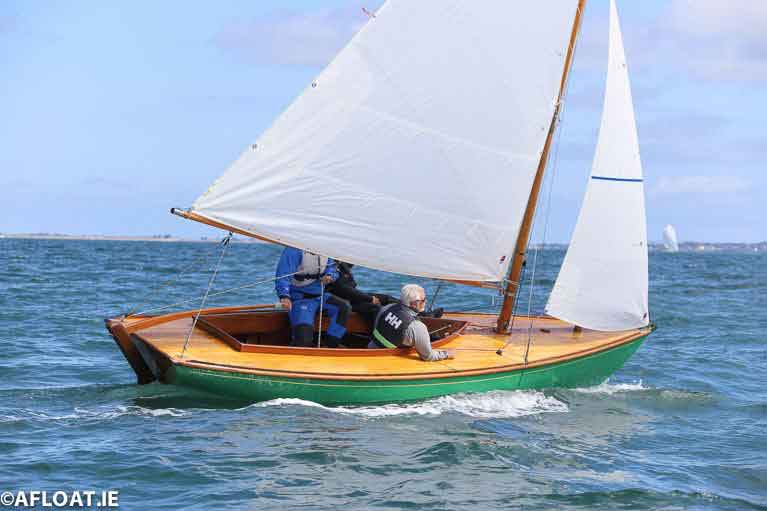 The 106-year-old Seabird Half Rater Scoter was helmed to the class’s overall win in VDLR 19 by RORC CEO Eddie warden-Own. Photo: Afloat.ie/David O’Brien
The 106-year-old Seabird Half Rater Scoter was helmed to the class’s overall win in VDLR 19 by RORC CEO Eddie warden-Own. Photo: Afloat.ie/David O’Brien
Despite their vintage, the Seabirds couldn’t claim overall seniority at the VDLR, as the Howth 17s are a year older, and it was one of the oldest Howth 17s, Ian & Judith Malcolm’s 121-year-old Aura, which topped the class by one point from Brian & Conor Turvey’s Isobel, a mere stripling from 1988.
Of course, if it’s total history you’re into, then although the Water Wags which currently race in the bay are to a design from 1900, their origins go back to 1887, but whatever their age, the sport is better than ever, the class continues to increase with Number 50 expected afloat for 2020, and meanwhile at VDLR19 it was Guy Kilroy’s Swift which won overall from Cathy MacAleavey’s Mariposa.
That’s the charm of the Volvo Dun Laoghaire Regatta, particularly when the weather is obliging as it was once again in 2019. For although it involves an enormous fleet, within each of the 32 classes there was an intense sense of community which every so often over-lapped with the class next door, and of course spread further at the apres sailing in the four clubs which was Dun Laoghaire at its best.
Of course, somewhere in all this, some mathematical and computer genius is churning out results, and the miracle is that it all makes sense at the traditional prize-giving late on the Sunday afternoon. There, the top boats were Class 0: Eleuthera (Frank Whelan, Greystones SC), Class 1 Joker 2 (John Maybury, RIYC), RC35 Storm (Pat Kelly, RSC & HYC); Class 2 (A) Checkmate XVIII (Nigel Biggs (RIYC & HYC); Class 2 (B) Dux (A Gore-grimes (HYC); Class 3 F’n Gr8 (Rory Fekkes, Carrickfergus SC); Class 4 She Too (Jonathan Fawcett, South Caernarvon YC); Coastal A: Mermaid IV (Seamus Fitzpatrick, RIYC), Coastal B: Mojito (Peter Dunlop & Vicky Cox, Pwllheli SC).
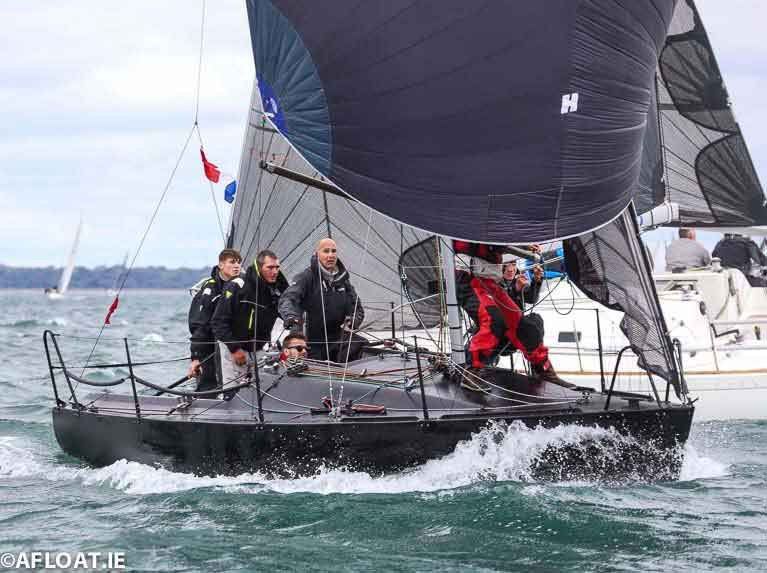 Rory Fekkes; up-graded First Class 8 from Carrickfergus won her class at VDLR19. Photo: Afloat.ie/David O’Brien
Rory Fekkes; up-graded First Class 8 from Carrickfergus won her class at VDLR19. Photo: Afloat.ie/David O’Brien
When you combine the full complexity of those results with the ins and outs of the many One-Design Classes, for most of us it then becomes an impenetrable maze. But the organising committee have a formula whereby the overall champion can be calculated by leaderboard results interacted with class numbers, and out of this magic theorem the Supreme Champions of VDLR 19 were Dave Gorman and Chris Doorly of the National YC racing Betty in the large Flying Fifteen class, where their programme was so well completed that they discarded a 3rd and a second, and otherwise apart from another second, they’d a clean sweep of seven wins.
For those who found the VDLR simply too much in its sheer weight of numbers, there was soon escape nearby with the Wayfarer Worlds at Greystones. Normally an international fleet of 63 boats including strong contingents of Danes and Canadians in addition to the preponderance of UK entries would have seemed a bit on the crowded side, but the Wayfarers are different, some of them really do cruise their boats, but equally they provide great racing, and after an excellent championship, it was sailmaker Mike McNamara from East Anglia who took the title.
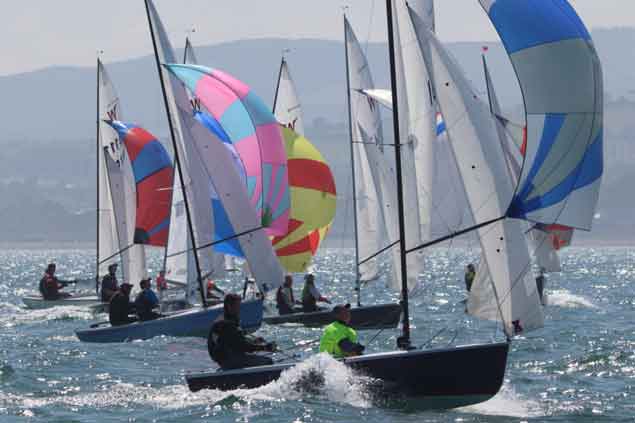 Sixty-three Wayfarers raced at Greystones in their Worlds, and found some of 2019’s best sailing conditions. Photo: Alan Jones
Sixty-three Wayfarers raced at Greystones in their Worlds, and found some of 2019’s best sailing conditions. Photo: Alan Jones
Meanwhile those still trying to analyse the VDLR results in their totality risked brain meltdown, but with the season’s big one now very successfully put to bed, it was hugely refreshing to look westward, because before July was gone, Galway Bay Sailing Club had organised an imaginative Cruise-in-Company from Galway to Lorient in Southern Brittany for 27 boats in co-ordination with the Yacht Club de Lorient – who sent three boats to cruise back with their Connacht friends. It was largely the doing of Cormac Mac Donncha, and the planning was meticulous yet light of touch, while the new or refreshed seagoing confidence instilled in a fleet of boats drawn from many sailing centres in the west will be of real benefit in the future.
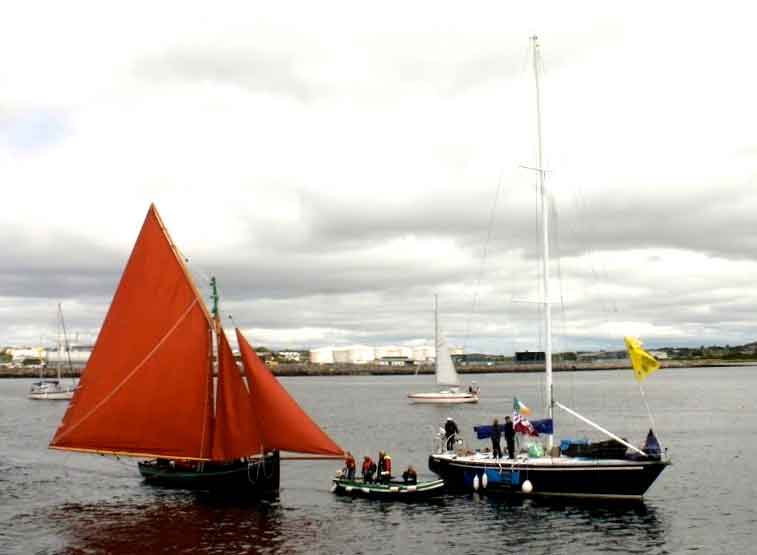 Peter Connolly’s Galway Hooker from the Claddagh greets Lorient YC’s President Jean-Gab Samzun’s Peterson 46 Trilogy in Galway Bay before the combined fleet of 27 boats departed for the Galway-Lorient Cruise-in-Company in July. Trilogy was originally Robin Aisher’s Yeoman XXI which successfully completed the 1979 Fastnet Race, and in the crew was the owner’s daughter Sally who – as Sally O’Leary, wife of former RCYC Admiral Anthony O’Leary – attended the Fastnet 79 Reunion lunch in Howth Yacht Club on October 11th. Photo: Patricia Cannon
Peter Connolly’s Galway Hooker from the Claddagh greets Lorient YC’s President Jean-Gab Samzun’s Peterson 46 Trilogy in Galway Bay before the combined fleet of 27 boats departed for the Galway-Lorient Cruise-in-Company in July. Trilogy was originally Robin Aisher’s Yeoman XXI which successfully completed the 1979 Fastnet Race, and in the crew was the owner’s daughter Sally who – as Sally O’Leary, wife of former RCYC Admiral Anthony O’Leary – attended the Fastnet 79 Reunion lunch in Howth Yacht Club on October 11th. Photo: Patricia Cannon
Still on the Atlantic seaboard, the end of July saw the WIORA Championship at Foynes, but although the fleet was drawn from several clubs, it was soon clear that Foynes’ own McCormack brothers in their J/24 Stouche were on a roll, and they finished as overall champions with five wins and two seconds.
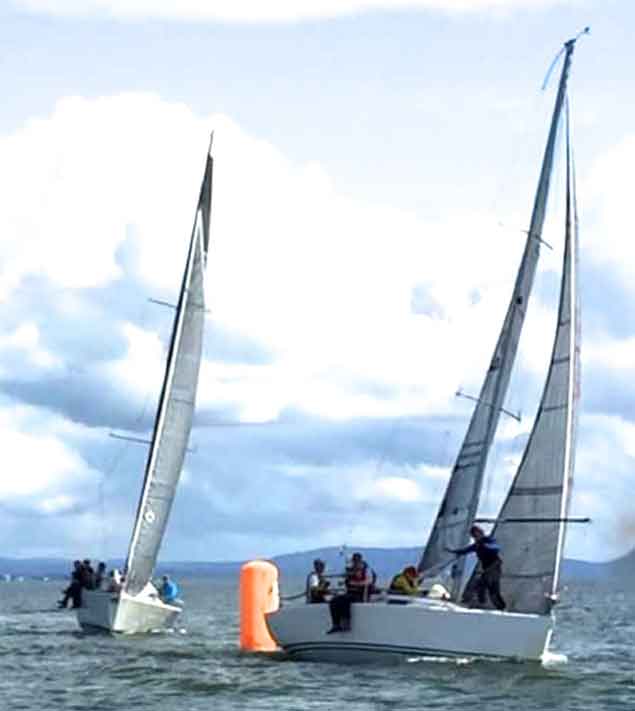 The WIORA Championship at Foynes grabbed its bit of summer when it was found.
The WIORA Championship at Foynes grabbed its bit of summer when it was found.
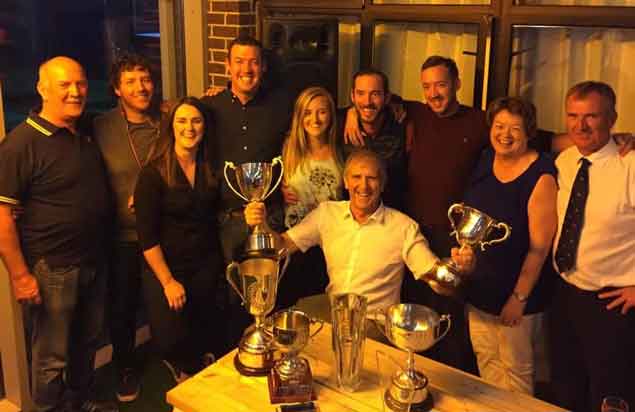 The McCormack Clan of Foynes had much to celebrate after the WIORA Championshp and the Mermaid Nationals
The McCormack Clan of Foynes had much to celebrate after the WIORA Championshp and the Mermaid Nationals
Barely had the prizes been distributed before the McCormacks were gone from Foynes, for of course in addition to his J/24 expertise, Darragh McCormack’s talents include Mermaid racing with the family’s beloved and beautifully-maintained Innocent, and he was on to defend his 2018 title in the Mermaid Nationals 2019 at the Royal Cork, the first time ever that Crosshaven has hosted this historic event.
There was a fleet to match the star quality of the linkup, and there was no way the likes of Paddy Dillon from Rush was going to give Darragh McCormack an easy ride of it, so much so that going into the final day the Foynes helm lay third while Dillon was first with Wexford’s Derek Joyce and Skerries’ Mark Boylan also very much in the hunt. But McCormack kept his cool and by the end of the day he’d won overall by 2.25 points, his second championship in ten days.
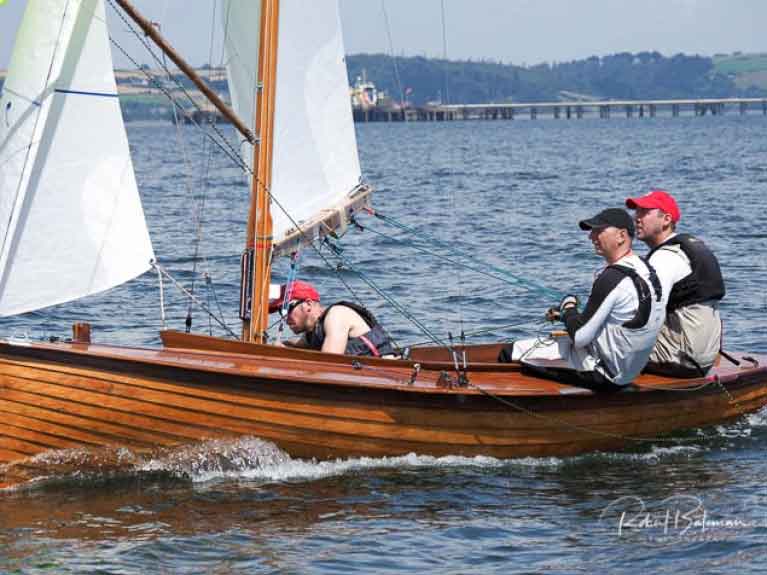 Darragh McCormack and his brothers on their way to victory in the Mermaids at Crosshaven. Photo: Robert Bateman
Darragh McCormack and his brothers on their way to victory in the Mermaids at Crosshaven. Photo: Robert Bateman
Suddenly, we were in August, with eleven Irish boats in the record-fleet Rolex Fastnet Race on August 3rd, and a fascinating lineup of cruiser-racers descending on West Cork for Calves Week at Schull. It was the first time the two events were on in the same week, but even though the Fastnet Rock might be used as a mark of the course during Calves Week, it was a time for crowded emotions rather than crowded race marks as it was the 40th Anniversary of the Fastnet Race ’79 disaster, and the restored Robert – the Baltimore lifeboat in 1979 – had been brought to her old home port by her restorer Jeff Houlgrave to meet up with current Baltimore cox’n Kieran Cotter, whose period of service is such that it runs from that historic time through other noted rescues such as the 2011 rescue of the crew of George David’s Rambler 100 after her keel had fractured.
Also involved in the commemoration was Gerard Butler, lighthouse keeper on the rock in ’79, but so much was going on at the time that the full significance of the West Cork and Irish contribution to the saving of many lives was difficult to put into perspective until October this year, when a commemorative lunch was hosted by Howth Yacht Club by Fastnet 79 survivors Kevin Burke, Peter Lennon and Brian Turvey.
In all, 18 Irish yachts had been racing in the 1979 fleet, and while three had finished with the great Denis Doyle’s Swan 44 Moonduster the best-placed to win the Gull Salver, many had simply retired to the nearest safe port, while others such as Ken Rohan’s Regardless and Hugh Coveney’s Golden Apple had taken assistance.
Yet with so many rescue agencies officially involved, there has subsequently been very little personal contact between the rescue services and those who were racing. With forty years elapsed and people fading from the scene, the three Howth sailors felt that as so many east coast boats had been involved, an east coast club might provide the ideal setting for both sides to get together socially, mainly as an opportunity for the racers to say a heartfelt and intensely personal “Thank you” to the key personnel involved.
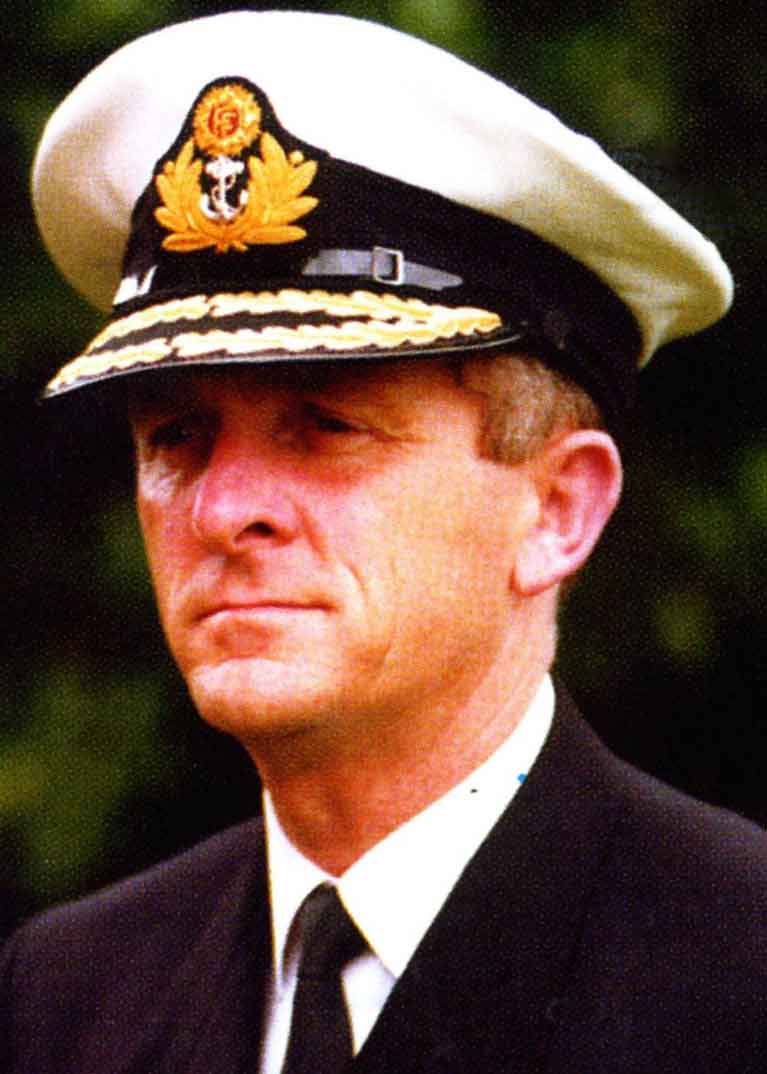 Commodore John Kavanagh. The Fastnet 79 Lunch of October 11th finally enabled him - together with Baltimore Lifeboat Cox’n Kieran Cotter and Fastnet Rock Lighthouse Keeper Gerard Butler – to meet many of the Irish sailors ho had taken part in the race.
Commodore John Kavanagh. The Fastnet 79 Lunch of October 11th finally enabled him - together with Baltimore Lifeboat Cox’n Kieran Cotter and Fastnet Rock Lighthouse Keeper Gerard Butler – to meet many of the Irish sailors ho had taken part in the race.
These included Commodore John Kavanagh of the Naval Service who was in command of the LE Deirdre on station throughout the rescue prior and often giving active assistance, Gerard Butler whose calm presence on the Fastnet Rock was reassuring to all, and Kieran Cotter whose devotion to the Baltimore Lifeboat and to the wellbeing of West Cork and its islands has been a lifetime service.
When the idea was first mooted, it had seemed almost too vague in its objectives, but on the day – October 11th – all doubts were cast aside. Crews from 1979 came together again from far and wide, and in some cases, it was the first time they’d met in forty years. No less than three former Admirals of the Royal Cork YC were present, as too was a former Admiral and Commodore of the Royal Ocean Racing Club, together with other former officers of that remarkable organisation.
And there in their midst were Commodore John Kavanagh, Cox’n Kieran Cotter, and Lighthouse keeper Gerard Butler, exceptional people who had done a wonderful job, people who can never really be properly thanked, but simply to be with them was to experience an extraordinary gathering which will never be forgotten by those taking part.
And it was something which will in turn add to the mystique of the Fastnet Race, which is now at such a level that its 350 places were booked out within minutes of going online early in 2019, and the same will happen again in 2021. In 2019, there were eleven Irish boats taking part in a race which became increasingly rugged as the neared the Irish coast in freshening nor’westers. And while none looked like matching Ger O’Rourke’s great overall victory with the Cookson 50 Chieftain in 2007, Conor Doyle of Kinsale – nephew of the legendary Denis – was best placed of the Irish with his Xp 50 Freya to win the Gull Salver which his uncle had won in that ill-fated race of 1979.
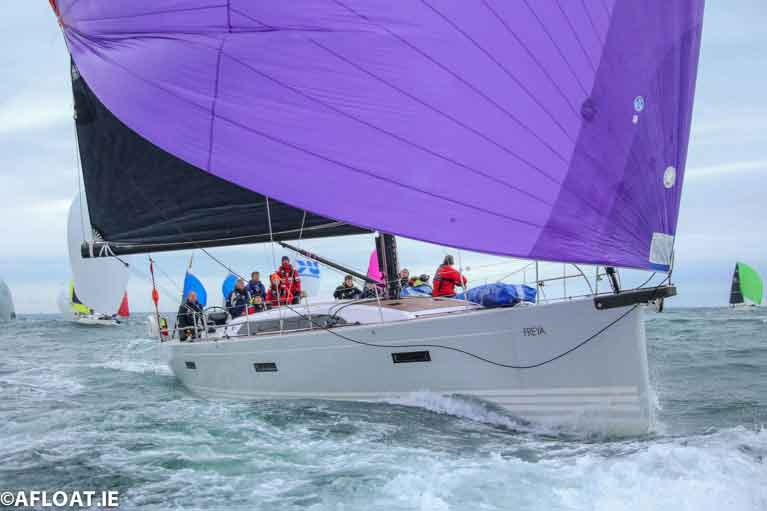 Conor Doyle’s Xp 50 Freya from Kinsale was top-placed of the Irish boats in the 2019 Rolex Fastnet Race to win the Gull Salver. Photo: Afloat.ie/David O’Brien
Conor Doyle’s Xp 50 Freya from Kinsale was top-placed of the Irish boats in the 2019 Rolex Fastnet Race to win the Gull Salver. Photo: Afloat.ie/David O’Brien
Within classes, some success looked more likely, as for a while the two Sunfast 37 boats of Irish Offshore Sailing of Dun Laoghaire – Desert Star skippered by Ronan O Siouchru and Sherkin skippered by Daniel Smith - were in a one-on-one battle for the Roger Justice Trophy for the best-placed sailing school entry, but a light patch towards the finish as they raced neck-and-neck saw their chances slip to leave Desert Star second and Sherkin third – excellent results perhaps, but Irish offshore schools have become accustomed to winning the Roger Justice.
As for Calves Week (which is actually just four days), some of it was sailed in conditions which even hardened Fastnet racers found quite demanding, while the partying ashore was its usual boisterous self. But for the crew of Paul O'Higgins' JPK10.80 Rockabill VI, a high level of celebration was merited as they won overall from a quality fleet which included boats of the calibre of Eleuthera, Jelly Baby and Nieulargo.
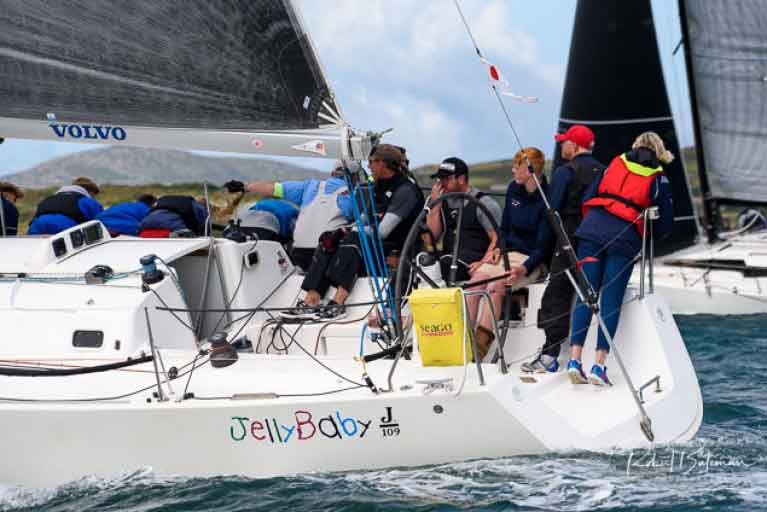 The Jones family’s J/09 Jelly Baby was third boat in IRC One in Calves Week 2019. Photo: Robert Bateman
The Jones family’s J/09 Jelly Baby was third boat in IRC One in Calves Week 2019. Photo: Robert Bateman
North along the Atlantic seaboard, the 40th of Cruinniu na mBad, the “Gathering of the Boats” built around the traditional deliveries of Connemara turf to picturesque Kinvara snug in its southeast corner of Galway Bay, was celebrated as a tribute to the late Tony Moylan who set it going four decades ago. His vision has worked so well that these days the interaction between seafaring, traditional boat racing and western culture is almost weatherproof, but as was so often the case in 2019, the conditions improved on the Sunday and the event saw some fine traditional boat racing.
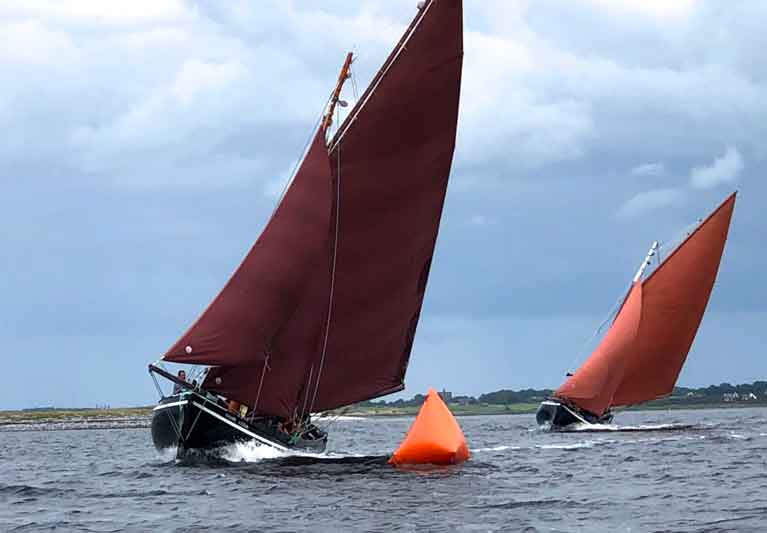 Skipper Pat Folan brings the Galway Hooker Naomh Cailin to the mark during the racing at the 40th Anniversary Cruinniu na mBad at Kinvara in mid-August. Photo: Pierce Purcell
Skipper Pat Folan brings the Galway Hooker Naomh Cailin to the mark during the racing at the 40th Anniversary Cruinniu na mBad at Kinvara in mid-August. Photo: Pierce Purcell
The latter part of August saw a slew of One Design National Championships, both keelboats and dinghies. The Lasers went north, choosing Ballyholme for their Nationals with Ronan Wallace of Wexford on top in the Standard fleet, and Michael Crosbie of Royal Cork leading the 4.7s, while Ellen Barbour of County Antrim YC across the lough at Whitehead was top girl, and the Radials were won by Micheal O’Sulleabhain of Royal Cork.
The weekend of August 15 to 18th saw some particularly robust weather, indicating that the RORC had been wise – in the Autumn of 2018 - to move their Fastnet start back an entire fortnight, but in Ireland dates had been set on this weekend for the Optimist Nationals in Howth and the GP 14 Nationals in Skerries, and they went at it through thick and thin. The Sunday, in particular, had a bruising and squally westerly, and though they managed one race in Howth before declaring the championship completed, in the more exposed water off Skerries, the Geeps found their series had been completed after Saturday evening’s final event.
The Optimist event at Howth was on such a scale as to be almost incomprehensible, with 185 boats in all, and eleven nations taking part. IODAI has now become an international power. In the first race, local star Rocco Wright took the bullet, but this made him a marked man thereafter by the likes of American Freddie Parkin, who put his stamp very firmly towards the front of the fleet thereafter. But James Dwyer Matthews of Cork (he gives allegiance to both Kinsale and Crosshaven) was always there or thereabouts, and in the final day’s big wind, while Parkin went down the mine, Dwyer Hickey kept his cool for a commanding performance to take the overall win, and though Parkin managed to hold onto second overall, the host club’s Luke Turvey, Rocco Wright and Johnny Flynn were next in line at 3rd, 4th and 5th.
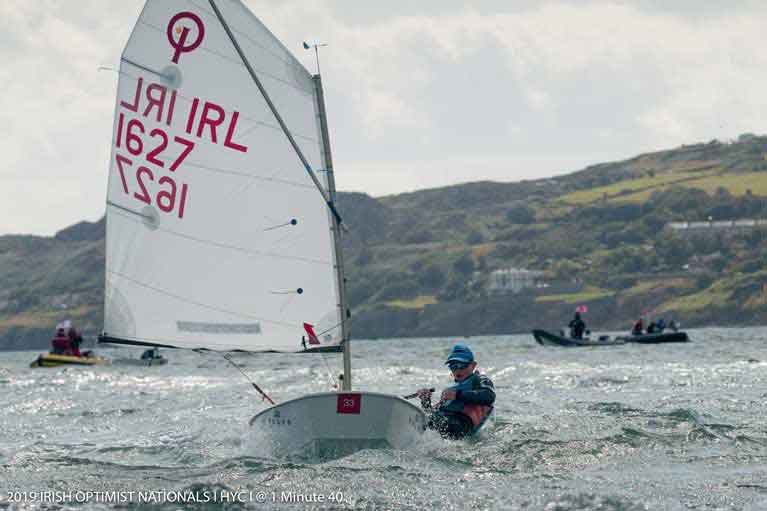 Keeping his cool – the strong winds of the final day at the Irish Optimist Nationals were the making of James Dwyer Matthews of Cork, who moved into the overall lead and the championship title in the final race.
Keeping his cool – the strong winds of the final day at the Irish Optimist Nationals were the making of James Dwyer Matthews of Cork, who moved into the overall lead and the championship title in the final race.
This was some indication of the strength of the class in Ireland, already indicated by the fact that Rocco Wright had placed tenth overall – the best ever by an Irish helm – in the Oppy Worlds in July, and then in October he and James Dwyer Matthews were to star in the North Americans in the Bahamas, with Wright coming second while Dwyer Matthews was fifth.
As for the rugged old salts in the GP 14 Nationals up at Skerries, Shane McCarthy of Greystones – former GP 14 World Champion (2016) – was back on top form with longtime shipmate Damien Bracken to win overall from an impressive fleet which included several cross-channel talents keen to suss out the venue for 2020 GP 14s Worlds. As for McCarthy, he has a secret second life as a top single-hander in the Solo dinghy class mostly on the English circuit, and he ended the 2019 Solo programme third overall out of a very large fleet, while he rounded out the GP 14 season in Ireland by winning October’s Hot Toddy event on Lough Erne.
Lough Erne was also the setting on the weekend of August 23rd to 25th for the Irish J/24 Nationals with a good fleet. Much of the strength of the class is now to be found in the west, with young syndicates finding that the veteran J/24 provides an affordable way into sailing if everyone plays their part in supporting the upkeep, and ICRA has been particularly supportive of U25 initiatives. However, sailing conditions had been frustrating in Fermanagh with only five races out of a scheduled nine as the final day dawned calm, but Race Officer Derek Bothwell got them away as soon as a breeze hinted, and three races were completed in jig time.
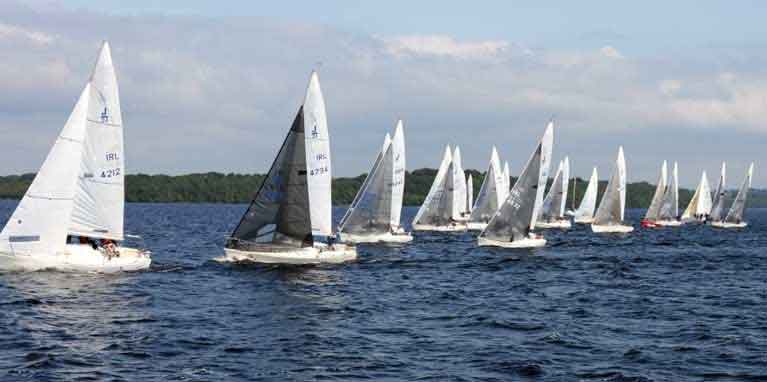 The success of the J/24 Nationals on Lough Erne was a very effective demonstration of the success of the ICRA U25 projects at clubs throughout the country
The success of the J/24 Nationals on Lough Erne was a very effective demonstration of the success of the ICRA U25 projects at clubs throughout the country
Until then, it had looked as though overnight leader Darragh McCormack of Foynes was going to add yet another trophy to his 2019 collection, but the truly all-Ireland team with Headcase (Cillian Dickson of Lough Ree & Howth, Sam O’Byrne of Howth, Louis Mulloy from Mayo SC, Marcus Ryan from Mayo and Ryan Glynn from Ballyholme) somehow worked their way up from third overall until in the final race they needed to be two clear places ahead of McCormack’s Stouche, and they did it with a third against a fifth, and a favourable countback.
The ICRA U25 award went to Tadgh O’Loinsigh and his squad from Tralee Bay, while the Silver Fleet was won by Colm O’Flaherty with Jana from Sligo and the Bronze by Conor Houghton from Wicklow, and if that’s not a truly national championhip outcome, then I don’t know what is.
At the end of August, the RS 400s descended in strength on Royal North of Ireland YC at Cultra for their British and Irish Championship, and while cross-channel star Nick Craig was overall winner, the home squad put in a good show, with Rob Espey and Richard McCullough of Ballyholme taking second to become the new Irish champions, while Chris Penney and Jessica Rutherford of Carrickfergus and Holywood were sixth overall and second in the Irish division.
September saw the conclusion of the 2019 Irish Sea Offshore Racing Association Programme, a series which is so cleverly designed to provide user-friendly time-efficient events on both sides and across the Irish Sea that the concluding event was officially billed as Race 16, even if nobody had actually sailed all 16 races. But it brought all the heavy hitters together for a finish in Dun Laoghaire to the cross-channel James C Eadie Cup race, and though notable performers such as Pwllheli’s double champion Mojito (J/109, Vicky Cox & Peter Dunlop) and Chris Power Smith’s J/122 Aurelia (RStGYC) were right there at the top of the leaderboard going into this final contest, it was Paul O’Higgins’ JPK 10.80 Rockabill VI which took the title at the very end in this, her most successful season, making it the first time an Irish boat has been ISORA Champion for several years.
The meticulous buildup to the Subaru Flying Fifteen Worlds in Dublin Bay in September, hosted by the National Yacht Club, led to a well-run champion which reminded us that in Dun Laoghaire terms, the Flying Fifteen functions as a very effective local class which can successfully aspire to competition up to regional and sometimes national level. But when the heavy hitters arrived in town from several nations for the 72-strong Worlds, the competition was lifted onto a new plane.
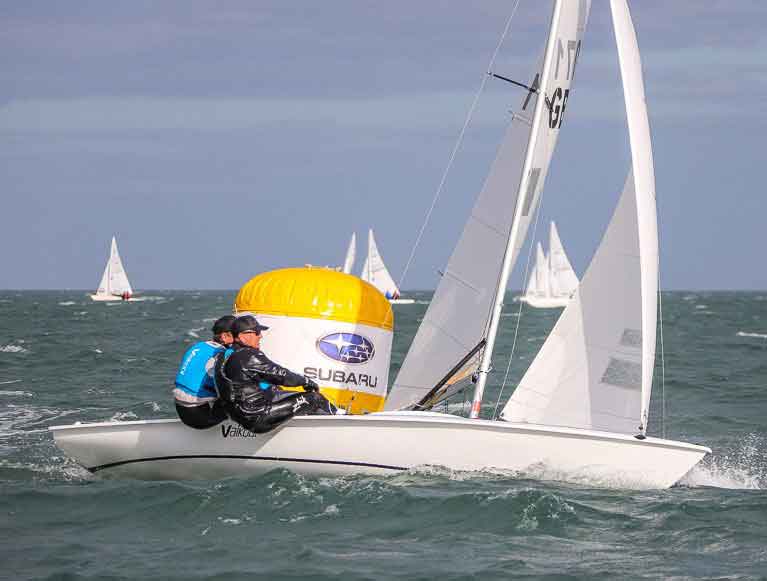 Graham Vials & Chris Turner, Flying Fifteen World Champions 2019, in winning form in Dublin Bay. Photo: Afloat.ie/David O/Brien
Graham Vials & Chris Turner, Flying Fifteen World Champions 2019, in winning form in Dublin Bay. Photo: Afloat.ie/David O/Brien
A very strong British contingent in dominant form saw Graham Vials and Chris Turner of Derwent lift the title with no less than six wins, and it was English crews all the way until fourth place overall, where Australia’s Mike Hart and Dean McAuley (Royal Freshwater Bay YC) made their mark. Best Irish were Andy and Rory Martin of Strangford Lough YC in 17th.
September brought the decidedly high-powered New York Yacht Club Invitational Series for crews from 20 major international clubs, racing the new Mark Mills-designed Melges IC 37 racing out of Newport, Rhode Island. Anthony O’Leary of Royal Cork has been involved in this series since it started, and 2019 was one of his best performances to finish third overall – he reckoned that years spent racing a Royal Cork 1720 provide ideal training for racing the similarly set up IC 37.
The DinghyFest in Crosshaven finally made its landing in mid-September, and while it attracted a very large and eclectic fleet, much attention was on the Rankins, those edge-glued ply clinker dinghies which were built by the Rankin brothers in Cobh. Now seen as traditional, they’re being restored and revived as a class on Cork Harbour, and they made for an attractive contrast with the modern all-fibreglass transparent-sailed machines which whizzed about in company with the latest versions of the National 18s.
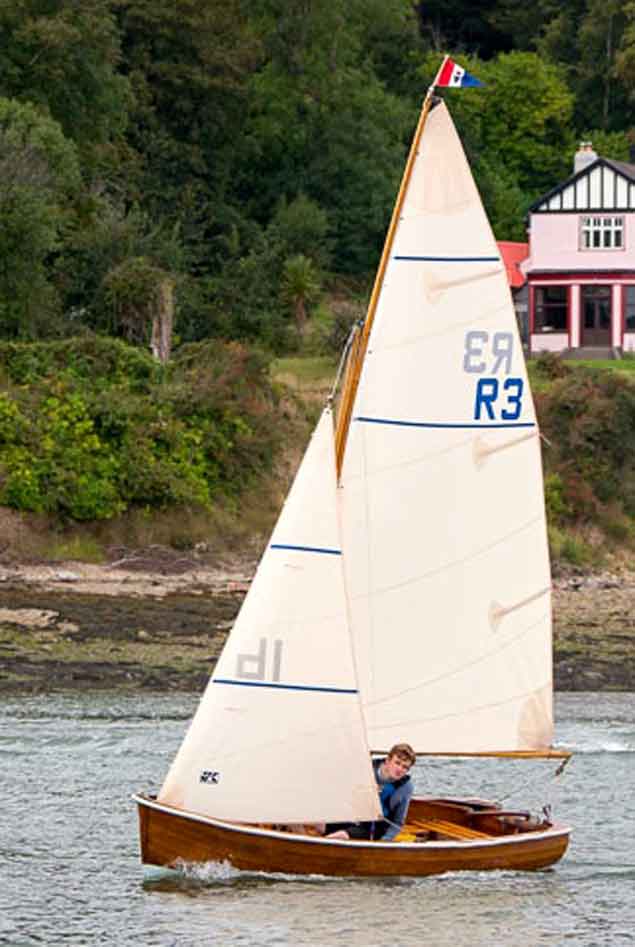 The revival of the Cork Harbour-developed Rankin dinghies is an encouragement for wooden boat enthusiasts in the south coast. Photo: Robert Bateman
The revival of the Cork Harbour-developed Rankin dinghies is an encouragement for wooden boat enthusiasts in the south coast. Photo: Robert Bateman
And it was out of the ranks of the newer machines that the contenders emerged for the All-Ireland Junior Championship at Schull in the final weekend of September. But as they sailed the competition in Schull’s own TRS 3.6 dinghies developed by David Harte, the more hefty young helms had to compensate by finding small crew, so the robust Christ Bateman of Cork who emerged from the ranks of RS 200 racing and turned 18 just a week before the junior finals press-ganged his 9-year-old brother Olin – half his age and half his weight – into service, and they duly won in some excellent racing, with second place going to Clare Gorman of the National YC.
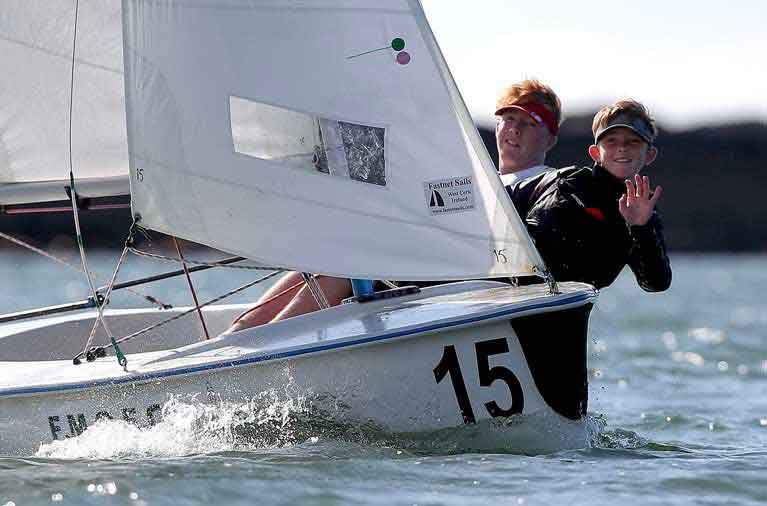 Rising talent. Chris Bateman, crewed by his brother Olin, on his way to victory in the All-Ireland Junior Championship at Schull
Rising talent. Chris Bateman, crewed by his brother Olin, on his way to victory in the All-Ireland Junior Championship at Schull
The grown-up version came a week later, the 73rd Annual All-Ireland Sailing Championship being raced in Flying Fifteens in Dun Laoghaire with Peter Kennedy (SB 20) of Strangford Lough the defending champion in a brisk weekend, at first out on Dublin Bay and then with the finals raced within the harbour in some very intense sailing.
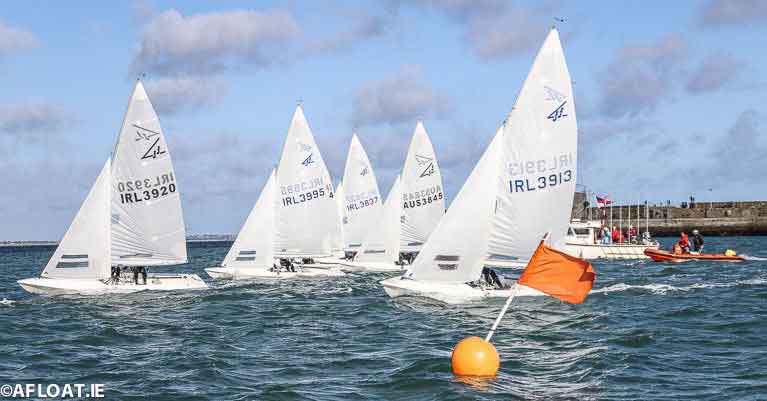 Perfect conditions for the final day’s racing in-harbour in the All Ireland Championship at the National Yacht Club. Photo: Afloat.ie/David O’Brien
Perfect conditions for the final day’s racing in-harbour in the All Ireland Championship at the National Yacht Club. Photo: Afloat.ie/David O’Brien
Among those competing was Michael O’Connor of Royal St George, who had emerged as the new SB 20 Champion in the Nationals raced at RIYC at the end of August, and in addition to the fact that he has been World Corinthian Champion in the class, his crew for the All Ireland was Davy Taylor, who had crewed for Ben Duncan when he won the All-Ireland in 2013.
David Taylor did it again, guiding his man to the win with Ballyholme’s Rob Espey of the RS 400s second and Shane McCarthy from Greystones and the GP 14s third, a result which handed over the reins of the Irish SB20 Class in very good heart to new top honcho John Malone of Lough Ree YC.
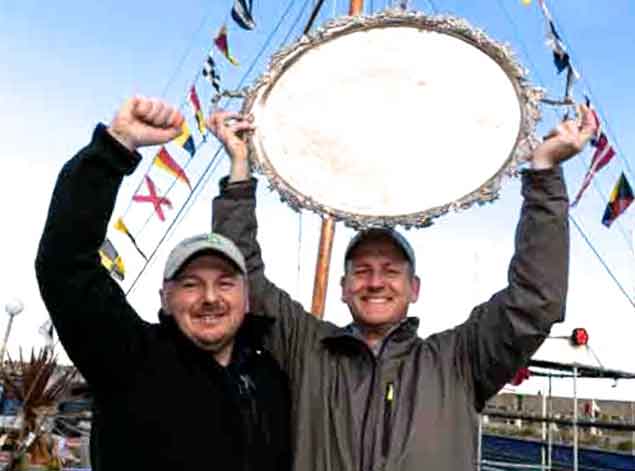 Another success for the SB20 class, and for ace crewman Davy Taylor (left) who helped Michael O/Connor (with salver) to win the All-Ireland in 2019, just as he had helped Ben Duncan in 2013. Photo: Irish Sailing/David Branigan
Another success for the SB20 class, and for ace crewman Davy Taylor (left) who helped Michael O/Connor (with salver) to win the All-Ireland in 2019, just as he had helped Ben Duncan in 2013. Photo: Irish Sailing/David Branigan
October continued with the J/109 Nationals in Dublin Bay won yet again by John Maybury’s Joker 2 (RIYC), while across in Howth the Beshoff Motors Autumn League was generally blessed in finding good weather when it was needed to record a seven-race series out of which the Puppeteer 22 Trick-or-Treat (Alan Pearson & Alan Blay) was so successful in the largest class numerically that she also became Overall Champion. And while Paul O’Higgins’ JPK 10.80 Rockabill VI may have had to be content with third overall in IRC 1 as the racing pattern better suited the J/109s Storm (Pat Kelly) and Outrajeous (Richard Colwell & Johnny Murphy), it gave the enthusiastically-campaigned RIYC boat the accumulated total under the new championship formula to become ICRA Boat of the Year 2019 by just one point, a perfect ending to the season.
































































